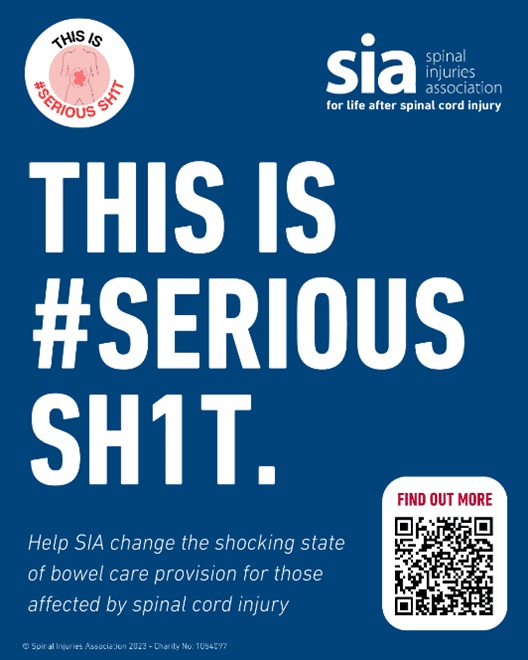
This is #SeriousSh1t – A Spinal Injuries Association Campaign
“Imagine …… you are unwell, trapped in bed. Despite asking for help you have been told you cannot go to the toilet. You have been put in a nappy and told you must open your bowels in that and wait for someone to come and clean you up …. When they are free!”
As a Trusted Legal Partner of the Spinal Injuries Association (SIA), Bolt Burdon Kemp is always extremely keen to support any campaign the SIA undertake. However, when I heard about the #SeriousSh1t campaign earlier this year I was especially keen to get involved. The reason behind this is that over the course of my career as a solicitor specialising in spinal cord injury, clients have repeatedly said to me that it is the bladder and bowel issues affect them the most. For a lot of the general public the perception of a spinal cord injury is that it affects mobility. It is not common knowledge that a spinal cord injury affects any number of bodily functions including bowel and bladder functions and I can think of several people who have said to me that if they had to choose between regaining their mobility or regaining control of their bladder and bowels, they would choose the latter in a heartbeat.
So, what is the SIA’s #SeriousSh1t campaign about? Well, the campaign specifically focuses on bowel care in hospital settings. Because if you had suffered a spinal cord injury and you had to be admitted to your local hospital, would you assume that you will receive support to maintain your day to day bowel care regime? Well, if you did make that assumption a lot will depend on which hospital you are admitted to.
As part of their campaign the SIA carried out a Freedom of Information request to all NHS England Trusts, the Welsh Health Boards as well as the Health and Social Care Trusts in Northern Ireland. The results were as follows:
- Of the 123 NHS Trusts across England only 54 reported having a formal written policy for dealing with the specialist bowel care required for those with a spinal cord injury;
- 26 Trusts admitted they had no bowel assessment and management policy in place at all;
- 40 Trusts saying they had no ward-based staff skilled in supporting these patients.
It makes for pretty gloomy reading. But what if you had family or carers who usually assist with your bowel care at home? They are all properly trained and they are willing to come in and assist with your bowel care in hospital. You would assume that would be possible right? Well again, it will be a bit of a postcode lottery:
- 65 Trusts said they didn’t have a policy that allows for the personal care assistants/carers to assist with the bowel care element of the patient’s care;
- 37 Trusts in total either didn’t respond or declined to comment;
- 21 Trusts said they did have a policy that allows this to happen.
But what does this mean in reality for someone with a spinal cord injury who is admitted to a hospital, with no bowel assessment and management policy in place and no policy that allows for you to utilise your own existing care? Well, the SIA ask you to imagine the following:
“Imagine ….. you are unwell, trapped in bed. Despite asking for help you have been told you cannot go to the toilet. You have been put in a nappy and told you must open your bowels in that and wait for someone to come and clean you up …. When they are free!
Your skin becomes sore and almost burnt from your own excrement. The bacteria from your poo has entered your bladder and you are becoming more unwell due to a bladder infection, with a risk of septicaemia. After a while you start to become constipated and your abdomen becomes so bloated that it is now difficult for you to breathe and you are developing a chest infection.
Your family and associates are willing to come in and help you go the toilet but they are not allowed.
Your bowel is becoming so full that there is a serious risk of bowel perforation but before this occurs you are terrified because you know if this doesn’t kill you then the risk of your blood pressure reaching such high levels could kill you anyway but no one is listening.
You lay in the bed with all sense of dignity and control lost…. helpless.
Imagine ………”
So, what can you do? You can raise awareness! You can share this blog; you can direct people to the SIA’s #SeriousSh1t campaign page (which has a very powerful video from someone with lived experience of these issues!) and you can reach out to your local MP to ask them to challenge the status quo. An e-mail takes a minute, maybe not even that; spinal cord injury is a condition that people live with for their lifetime. To save someone the indignity of weeks or possibly months of hospital treatment with inadequate bowel care surely that’s worth a minute of your time?











